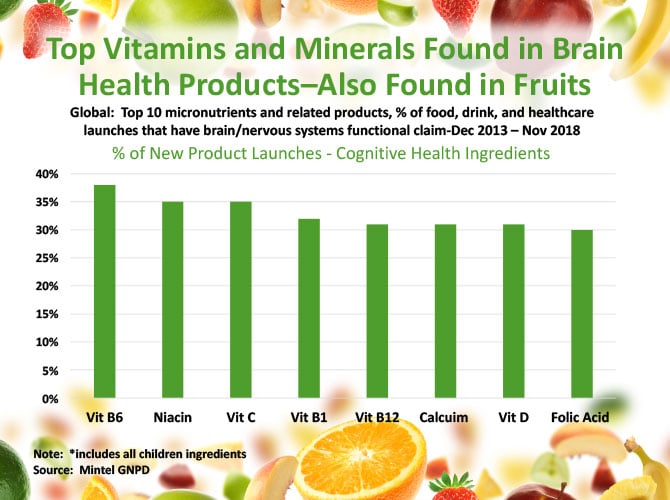In addition to exercising and sleeping right, correct nutrition plays a major role in development, protection, and maintenance of brain functions. Our brains require a constant supply of nutrients, vitamins, and minerals to keep up with the extraordinary work load of the central nervous system. The brain only makes up about 2% of the weight of a human adult. At the same time, this organ can be burning up to 20% of all consumed calories1. With signals racing through the neural network at 268 miles per hour2 – it’s no wonder that the brain has such high metabolic demands. It is critical to feed our bodies right so we have the resources to build, guard, and preserve this vital system.
Fruits and vegetables are powerhouses of nutrition – supplying concentrated and tasty sources of macro and micronutrients that can help reduce stresses and slow age-related decline in brain function.

“Fruits are an essential part of any healthy diet because they supply several key nutrients such as vitamin C, potassium and B vitamins,” according to LiveStrong.com, “Fruits Containing Vitamin B” article.
Below are some of the important nutrients that have been shown to benefit cognitive health and are naturally found in numerous fruits.
Vitamin C
- Readily available in most fruits and vegetables, Vitamin C plays a critical role in brain function. This micronutrient is used to repair oxidative damage caused by free radicals. It also is used to generate the neurotransmitter norepinephrine3. The general function of norepinephrine is to mobilize the brain and body for action. In the brain, norepinephrine will increase alertness and vigilance, it assists forming and recall of memory, and focuses attention. In the rest of the body, norepinephrine increases blood pressure, triggers the release of glucose from stored forms and increases blood flow to our muscles4. Since our human metabolic systems cannot generate Vitamin C from within, we are dependent on a constant supply of dietary sources to maintain all these critical activities5. Men should consume 75 to 90 mg per day, while women need between 65 and 120 mg per day.
Fiber
- Prebiotics are a class of fibers that can be metabolized by human gut bacteria. These fibers not only help to feed beneficial bacteria and promote benefits of probiotic organisms, they also have been shown to significantly reduce the amount of cortisol, the stress hormone, found in the human body6. The connection between our digestive microbiome, gut and brain are starting to be better understood by doctors, nutritionists, and neuroscientists. Several different neuropsychological characteristics, such as resistance to anxiety and depression, have been linked to the proper feeding and function of the components of this communication pathway7. Soluble and insoluble fibers can be found in dried fruits and vegetables as well as nuts, seeds, beans, bran and other whole grains. Men should consume 30 to 38 grams of fiber daily, while women need 21 to 25 grams.
B-Vitamins
- The B-complex of vitamins play critical roles in building strong neural networks, maintaining white brain matter, and balancing the chemicals that make up the communication system for our nervous systems. Cognitive decline and dementia have been associated through multiple studies with low and sub-optimal levels of B-Vitamins.
- Thiamine – Vitamin B1 is important because it assists in metabolism of carbohydrates, lipids and amino acids. Decreased levels of thiamine can lead to nerve degeneration in the arms and legs8.
- Niacin – Vitamin B3 is required for several oxygen-reduction reactions within the brain. Deficiency in this vitamin can include symptoms such as headache, fatigue, depression, ataxia, poor concentration, delusions, and hallucinations. If left untreated, a niacin deficiency can lead to memory loss and psychosis9.
- Pantothenic Acid – Vitamin B5 is crucial to building and maintaining the white matter in our brains. This white matter makes up the sheathing that protects the signals as they travel through the neurons. Deficiencies of this vitamin can lead to slower reaction times and increased difficulty planning and processing information10.
- Pyridoxine – Vitamin B6 is concentrated in the brain at levels 100x the rest of the body. It is required for the generation of many of the neurotransmitters including serotonin, dopamine, GABA, and norepinephrine. Deficiency can lead to brain fog, irritability, and depression11.
- Biotin – Vitamin B7 helps us metabolize fatty and amino acids. While deficiency is rare, prolonged absence or hereditary disorders have shown that deficiency will lead to depression, numbness and tingling of the extremities, hallucinations and lethargy12.
- Folic Acid – Studies with older women have shown that eating diets high in folate containing fruits and vegetables has slowed the generation of beta-amyloid plaques in the brain which reduce the transmission of signals between brain cells and eventually kill them off13. Keeping folate levels high every day will provide the maximum benefit to slowing the decline of attention, decision making, and reasoning.
- Cobalamins – Vitamin B12 deficiency can affect as much as 10 to 15% of the population over the age of 6014. This vitamin, like B5, plays an important role in protecting the myelin sheath, the fatty substance that covers the neurons and allows signals to pass uninterrupted through the nervous system. Reduction in this nutrient leads to difficulty with motor skills, reduction in comprehension and concentration, memory loss, and dementia15. But the good news is that supplementation of the diet with additional B12 can partially reverse the effects of deficiency.
Mintel, a market research firm, recently published a report titled “Formulating for Cognitive Health”, and predicts products developed to support the multiple areas of brain health have potential to grow in an era that is starting to prioritize self-care and healthy aging.
Tree Top’s product development team is often tasked with creating blends of fruit to meet a specific customer need whether that be for color or flavor enhancement or for their nutritional properties. Cognitive health is a newer category for us, but growing. Fruits have always carried a Health Halo image and now might be an effective ingredient solution for formulating products targeting brain health. Bananas, pomegranates, pineapples, apricots, blueberries, and strawberries all contain Vit B. Fruits high in Vit C. are guavas, strawberries, blackberries, and citrus fruits. Many fruits are a good source of fiber, raspberries, blackberries, pears, and apples top my list.
Whether you are developing product for brain health or whatever your application might be, Tree Top’s R&D team can help you with your development needs. We specialize in all forms of fruit and have worked with customers to formulate an array of applications.
If you would like a sample to help with your next project, click here. To learn more about our fruit ingredients and how they might function in your specific product, view our whitepapers under the resource tab, or visit our product pages.
References:
- Brain energy metabolism. In: Squire L, Berg D, Bloom F, du Lac S, Ghosh A, Spitzer N, eds. Fundamental neuroscience. Amsterdam: Academic Press; 2008:271-293.
- Ross, Valerie.“Numbers: The Nervous System, From 268-MPH Signals to Trillions of Synapses.” Discover Magazine, Kalmbach Media, March 2011, http://discovermagazine.com/2011/mar/10-numbers-the-nervous-system
- Haller J. Vitamins and brain function. In: Lieberman HR, Kanarek RB, Prasad C, eds. Nutritional Neuroscience. Boca Raton: CRC Press; 2005.
- Cassata, Cathy. “What is Norepinephrine?” Everyday Health, Ziff Davis, December 2015, https://www.everydayhealth.com/norepinephrine/guide/
- Harrison FE, Bowman GL, Polidori, MC. Ascorbic Acid and the Brain: Rationale for the Use against Cognitive Decline. Nutrients. 2014 Apr 24; 6: 1752-81
- Schmidt K, Cowen PJ, Harmer CJ, Tzortzis G, Errington S, Burnet PW. Prebiotic intake reduces the waking cortisol response and alters emotional bais in healthy volunteers. Psycopharmacology. 2014 Dec 3; 232(10): 1793-1801.
- Breit S, Kupferberg A, Rogler G, Hasler G. Vagus Nerve as Modulator of the Brain-Gut Axis in Psychiatric and Inflammatory Disorders. Front Psychiatry. 2018 Mar 13; 9: 44
- Rindi G. Thiamin. In: Ziegler EE, Filer LJ, eds. Present Knowledge in Nutrition. 7th ed. Washington D.C.: ILSI Press; 1996:160-166.
- Hegyi J, Schwartz RA, Hegyi V. Pellagra: dermatitis, dementia, and diarrhea. Int J Dermatol. 2004;43(1):1-5.
- Brody T. Lipids. Nutritional biochemistry. 2nd ed. San Diego: Academic Press; 1999:311-378.
- Leklem JE. Vitamin B6. In: Machlin L, ed. Hanbook of vitamins. New York: Marcel Decker Inc.; 1991:341-378.
- Healton EB, Savage DG, Brust JC, Garrett TJ, Lindenbaum J. Neurologic aspects of cobalamin deficiency. Medicine (Baltimore). 1991;70(4):229-245.
- Mattson MP, Duan W, Chan SL, Cheng A, Haughey N, Gary DS, et.al. Neuroprotective and neurorestorative signal transduction mechanisms in brain again: modification by genes, diet and behavior. Neurobiology of Aging.2002; 23: 695-705
- Baik HW, Russell RM. Vitamin B12 deficiency in the elderly. Annu Rev Nutr. 1999;19:357-377.
- Healton EB, Savage DG, Brust JC, Garrett TJ, Lindenbaum J. Neurologic aspects of cobalamin deficiency. Medicine (Baltimore). 1991;70(4):229-245.




